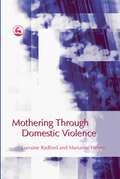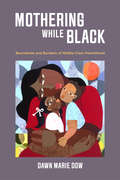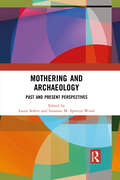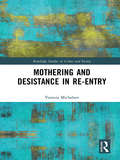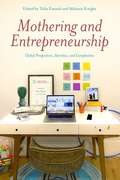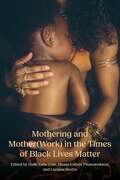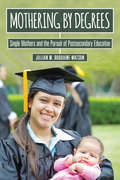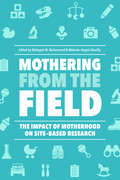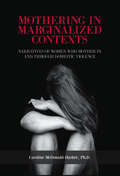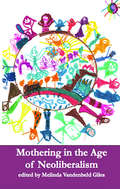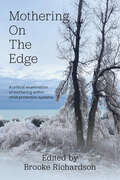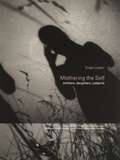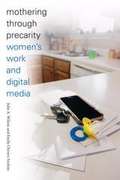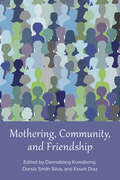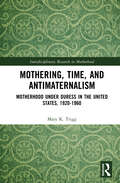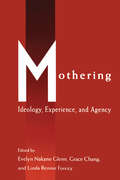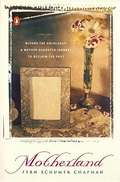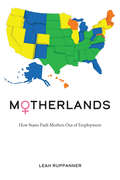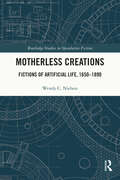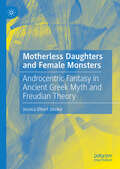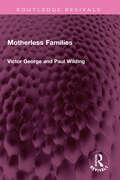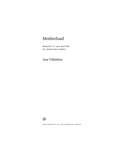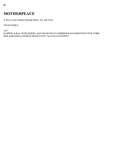- Table View
- List View
Mothering Through Domestic Violence
by Marianne Hester Lorraine RadfordResearch into children and domestic violence in recent years has emphasized the importance of giving positive support to a non-abusive parent for effective child protection. But what exactly does positive support involve? Based on findings from six primary research studies carried out by the authors themselves, as well as other published research, this book reveals how undermining mothering - specifically, family courts and social work agencies blaming mothers for their own victimization - plays a key role in locking women into abusive relationships and exacerbating the damage done by domestic violence. It explores the principle message drawn from the research: that the needs of individual victims should inform risk assessment and safety planning by welfare practitioners. Case studies are used to explore key issues that should be considered during assessment and planning, such as the psychological impact on children of living in an abusive household; mother and child protection from an abusive partner during court proceedings; and child contact with an abusive parent. Mothering Through Domestic Violence is essential reading for practitioners working in the fields of family and child welfare, family courts and policy makers.
Mothering While Black: Boundaries and Burdens of Middle-Class Parenthood
by Dawn Marie DowMothering While Black examines the complex lives of the African American middle class—in particular, black mothers and the strategies they use to raise their children to maintain class status while simultaneously defining and protecting their children’s “authentically black” identities. Sociologist Dawn Marie Dow shows how the frameworks typically used to research middle-class families focus on white mothers’ experiences, inadequately capturing the experiences of African American middle- and upper-middle-class mothers. These limitations become apparent when Dow considers how these mothers apply different parenting strategies for black boys and for black girls, and how they navigate different expectations about breadwinning and childrearing from the African American community. At the intersection of race, ethnicity, gender, work, family, and culture, Mothering While Black sheds light on the exclusion of African American middle-class mothers from the dominant cultural experience of middle-class motherhood. In doing so, it reveals the painful truth of the decisions that black mothers must make to ensure the safety, well-being, and future prospects of their children.
Mothering a Bodied Curriculum
by Stephanie Springgay Debra FreedmanThis collection considers how embodiment, mothering, and curriculum theory are related to practices in education that silence, conceal, and limit gendered, raced, and sexual maternal bodies. Advancing a new understanding of the maternal body, it argues for a 'bodied curriculum' - a practice that attends to the relational, social, and ethical implications of 'being-with' other bodies differently, and to the different knowledges such bodily encounters produce.Contributors argue that the prevailing silence about the maternal body in educational scholarship reinforces the binary split between domestic and public spaces, family life and work, one's own children and others' children, and women's roles as 'mothers' or 'others.' Providing an interdisciplinary perspective in which postmodern ideas about the body interact with those of learning and teaching, Mothering a Bodied Curriculum brings theory and practice together into an ever-evolving conversation.
Mothering and Archaeology: Past and Present Perspectives
by Laura SeifertMothering and Archaeology brings to light new insights connecting mothering in the past and present by exploring all aspects of this important but frequently under-valued and thus neglected subject and is underpinned by feminist theorizing of motherhood and mothering.Taking a comprehensive approach, this book explores the archaeology of mothers in private and public places in the past and present, the patriarchal institution of motherhood versus actual mothering practices, the burdens and joys of “mothering” in archaeology, and the second shift often pressed upon women. With the inclusion of intersectional research on diverse historic ideologies and practices of motherhood and mothering that varied among classes, races, and ethnic groups, the book also spans a wide range of temporal, geographic, and cultural differences around the world, from Ancient Egypt and Iron-Age Europe to Aztec Mexico, colonial Yucatan, colonial and historic Europe, America and Australia, and modern archaeologists in America and Europe. Going beyond historical practices, the book also examines how female-identifying archaeologists usually perform a disproportionate amount of mothering labor, particularly emotional labor, both in their careers and in the home. Further, it also addresses how becoming a mother affects women's archaeological practices and careers and discusses why women are doing most of the deeply engaged community archaeology with all of its additional relationships and social navigation of emotional labor.Bringing together research on motherhood and mothering in the past with women’s contemporary experiences of the relationships of mothering to archaeology, this book provides new insights to researchers in archaeology, anthropology, public history, and women’s studies.
Mothering and Desistance in Re-Entry (Routledge Studies in Crime and Society)
by Venezia MichalsenAlthough there is plentiful research on the impact of marriage, employment and the military on desistance from criminal behaviour in the lives of men, far less is known about the factors most important to women’s desistance. Imprisoned women are far more likely than their male counterparts to be the primary caretakers of children before their incarceration, and are far more likely to intend to reunify with their children upon their release from incarceration. This book focuses on the role of mothering in women’s desistance from criminal behaviour. Drawing on original research, this book explores the nature of mothering during incarceration, how mothers maintain a relationship with their children from behind bars and the ways in which mothering makes desistance more or less likely after incarceration. It outlines the ways in which race, gender, class, nationality, sexuality, gender identity, and other characteristics affect mothering and desistance, and explores the tensions between individual and system-level factors in the consideration of desistance. This book suggests that any discussion of desistance, particularly for women, must move beyond the traditional focus on individual characteristics and decision-making. Such a focus overlooks the role played by context and systems which undermine both women's attempts to be mothers and their attempts to desist. By contrast, in the tradition of Beth Richie’s Compelled to Crime, this book explores both the trees and the forests, and the quantum in-between, in a way that aims for lasting societal and individual changes.
Mothering and Entrepreneurship: Global perspectives, Identities and Complexities
by Talia Esnard;Melanie KnightThis book examines the complexities of mothers who are entrepreneurs in different parts of the world. This uniqueness and contribution to the area of women's entrepreneurship presents many challenges. One must historicize context; focus on socio-political realms and on lived realities. All challenging endeavours, when focusing on mothering and entrepreneurship, in different global contexts. What of the workers in these contexts? More specifically what of female workers within these contexts? How have women negotiated gendered roles within old and new structures? What complexities have preconfigured the diverse realities and positionalities of maternal-workers? How have these intricacies shifted the boundaries of work-family interface? This book focuses on a specific subset of work and the economy for mothers who are entrepreneurs in different parts of the world. In this edited collection, we examine how mothers are negotiating their entrepreneurial endeavors within the contexts of local and global economic shifts. We explore how the socio-cultural, economic and national contexts that (re)structure and (re)frame multiple nodes of power, difference, and realities for mothers as workers across diverse contexts. This type of contextual analysis allows for new lines of inquiry and questions that move beyond the descriptive profiling and gendered assessment of women entrepreneurs. Lastly, the mother-entrepreneur-worker-life balance frames our discussion. We particularly set the work-family discourse within many points of contentions related to how the researchers have conceptualized work-life interface, the specific assumptions embedded within these investigations, and the implications of these for how we (re)present the dynamics related to mothering and entrepreneurship. The participation of mothers within entrepreneurial space offers a rich site for analyzing the contextual nature of maternal identity, work life relationships and entrepreneurial identities. In so doing,
Mothering and Mother(Work) in the Times of Black Lives Matter
by Haile Eshe Cole;Shana Calixte Pitawanakwat;Luciane RochaMothering and Mother(work) in the Times of Black Lives Matter is an edited collection that sprouted alongside the beginnings of the Black Lives Matter movement but seeks to root itself in the historic and ongoing fight against anti-Black, state-sanctioned violence. Utilizing research, personal narratives, poetry and art, this book explores the experience of mothering and "motherwork" alongside these movements and efforts to protect and value Black life. Centering the voices of Black mothers, Black other mothers and Black birthing people, the collection also seeks to explore the just world that Black mothers hope to create for their futures and the futures of their families and communities.
Mothering by Degrees: Single Mothers and the Pursuit of Postsecondary Education
by Jillian M. Duquaine-WatsonIn Mothering by Degrees, Jillian Duquaine-Watson shows how single mothers pursuing college degrees must navigate a difficult course as they attempt to reconcile their identities as single moms, college students, and in many cases, employees. They also negotiate a balance between what they think a good mother should be, and what society is telling them, and how that affects their choices to go to college, and whether to stay in college or not. The first book length study to focus on the lives and experiences of single mothers who are college students, Mothering by Degrees points out how these women are influenced by dominant American ideologies of motherhood, and the institutional parameters of the schools they attend, and argues for increased attention to the specific ways in which the choices, challenges, and opportunities available to mothers are shaped within their specific environments, as well as the ways in which mothers help shape those environments.
Mothering from the Field: The Impact of Motherhood on Site-Based Research
by Ryanne Pilgeram Kelly Ward Cecilia Vindrola-Padros Lisa Wolf-Wendel Lindsey Alyssa Marco Stacey Camp Kelley Sams Lydia Zacher Dixon Muntaquim Muhammad Grace Karram Stephenson John M Stephenson Joanne Florence Karram Brian C Wolf Anne Hardgrove Kimberly Garland-Campbell Sarah Kelman Marylynn Steckley Deirdre Guthrie Aprille Ericsson Arielle Ericsson White Dawn Ericsson-Provine Mikae Provine Pierre EricssonThe heated national conversation about gender equality and women in the workforce is something that women in academia have been concerned with and writing about for at least a decade. Overall, the conversation has focused on identifying how women in general and mothers in particular fair in the academy as a whole, as well as offering tips on how to maximize success. Aside from a long-standing field-specific debate in anthropology, rare are the volumes focusing on the particulars of motherhood’s impacts on how scientific research is conducted, particularly when it comes to field research. Mothering from the Field offers both a mosaic of perspectives from current women scientists’ experiences of conducting field research across a variety of sub-disciplines while raising children, and an analytical framework to understand how we can redefine methodological and theoretical contributions based on mothers’ experiences in order not just to promote healthier, more inclusive, nurturing, and supportive environments in physical, life, and social sciences, but also to revolutionize how we conceptualize research.
Mothering in Marginalized Contents: Narratives Of Women Who Mother In And Through Domestic Violence
by Caroline Mcdonald-HarkerThis book provides a rare and in-depth examination of the narratives, experiences, and lived realities of abused mothers—a group of women who, despite being the victims, are often criticized, vilified, and stigmatized for failing to meet dominant ideologies of what a “good mother” is/should be, because they have lived and mothered in domestic abuse relationships. Based on a qualitative research study conducted with 29 abused mothers residing in abused women’s shelters in Calgary, Alberta, this book highlights the ways that these mothers experience the dominant ideology of intensive mothering, negotiate the resulting discourses of the “good” and the “bad” mother, and ultimately find ways to exercise agency, resistance, and empowerment in and through their mothering. This book discusses how abused mothers engage in empowered mothering by constructing valued, fortified, and liberating identities for themselves as mothers in the face of an ideology of intensive mothering that delegitimizes and subjugates them. These mothers are not passive victims, but rather are active agents who resist and question the idealized standards of intensive mothering as being restrictive and unachievable; who view their mothering in a positive light even though they have lived and mothered in social milieus deemed outside the boundaries of acceptable mothering; and who uphold that they are indeed worthy mothers despite their stigmatized status. Particular attention is given to the ways that intersections of gender, race, and social class shape and influence abused mothers constructions of their mothering identities. This book calls into question the false notion that there is only one standard, one definition, and one social location in which effective mothering is performed. It is a voice against the judgment of mothers, a call to end the oppressive and restrictive bifurcation of mothers into categories of either “good” or “bad” mothers, and an attempt to re-envision a more inclusive understanding of mothering. This book is a movement towards the empowerment of all mothers, regardless of differences in their lives and social circumstances.
Mothering in the Age of Neoliberalism
by Giles Melinda VandenbeldNeoliberal policies and austerity measures have unequivocally altered the landscape of women’s lives globally. The most detrimental effect has been on mothers as they are faced with increasing responsibility and decreasing resources. Despite mothers being the primary producers, consumers, and repro- ducers of the neoliberal world, their centrality has been largely silenced within economic discourse. Thus, Mothering in the Age of Neoliberalism calls for a new economic framework to counter the individualized neoliberal model, one in which the needs of mothers and children are prioritized. This volume provides a crucial starting point. By identifying the sources of neoliberal failure toward mothers, we can begin to collectively formulate an alternative paradigm in which mothers’ voices are no longer rendered invisible, but rather predominate in the global landscape.
Mothering on the Edge: A critical examination of mothering within child protection systems
by Brooke RichardsonThis book brings critical, scholarly attention to the systematic positioning and subjective experiences of mothers involved in child protection processes in “ risk” -based child protection systems (Parton, Thorpe and Wattam; Connolley; Swift and Callahan). While mothers are typically the primary focus of child protection prevention and investigations (Azzopardi et al.; Fallon et al.; Swift and Callahan), their gendered experiences, challenges and triumphs are seldom given space in the academic literature, practice and/or public spaces to be seen or heard. Chapters in this volume build on existing literature to illustrate the structural positioning and/or lived experiences of mothers who come into contact with child protection for a variety of reasons: substance (ab)use, positive HIV status, child injury, fetal alcohol syndrome, colonial assessment methodologies, young age, incarceration, childbirth, and intimate partner violence. This book offers three unique contributions to existing literature on mothering in child protection. First, it creates space for mothers involved in child protection to have their voices heard. Second, it acknowledges the centrality of mothers' subjective experience in keeping children safe. Finally, it challenges dominant, often dehumanizing narratives of mothers in involved in child protection through providing a more nuanced understanding of their lives. Ultimately this anthology calls for a fundamental rethinking of how mothers involved in child protection proceedings are conceptualized in child protection research, policy and practice. It is recommended that mothers voices must be central to humanely reforming child protection systems.
Mothering the Self: Mothers, Daughters, Subjects (Transformations)
by Stephanie LawlerThe mother-daughter relationship has preoccupied feminist writers for decades, but typically it has been the daughter's story at centre-stage. Mothering the Self brings together these maternal and daughterly stories by drawing on in-depth interviews with women who speak both as mothers and as daughters. This study examines the ways in which these mothers and daughters participate in their understanding of class, gender, and race locations, both using and resisting them. The result is a fresh start from which to consider the far-reaching implications of this relationship - not simply for mothers and daughters, but in terms of how we understand the shaping of the self and its place within the social world.
Mothering through Precarity: Women's Work and Digital Media
by Emily Chivers Yochim Julie A. WilsonIn Mothering through Precarity Julie A. Wilson and Emily Chivers Yochim explore how working- and middle-class mothers negotiate the difficulties of twenty-first-century mothering through their everyday engagement with digital media. From Facebook and Pinterest to couponing, health, and parenting websites, the women Wilson and Yochim study rely upon online resources and communities for material and emotional support. Feeling responsible for their family's economic security, these women often become "mamapreneurs," running side businesses out of their homes. They also feel the need to provide for their family's happiness, making successful mothering dependent upon economic and emotional labor. Questioning these standards of motherhood, Wilson and Yochim demonstrate that mothers' work is inseparable from digital media as it provides them the means for sustaining their families through such difficulties as health scares, underfunded schools, a weakening social safety net, and job losses.
Mothering, Community, and Friendship
by Dannabang Kuwabong;Dorsía Smith Silva;Essah DiazMothers, Community, and Friendship is an anthology that explores the complexities of mothering/motherhood, communities, and friendship from across interdisciplinary and multidisciplinary perspectives. The chapters in this text not only examine how communities and friendship shape and influence the various spectrums of motherhood, but also analyze how communities and friendship are necessary for mothers. Through personal, reflective, critical essays, and ethnographies, this collection situates the ways mothers are connected to communities and how these relationships forms, such as in mothering groups and maternal friendships. By calling attention to these central and current topics, Mothers, Community, and Friendship represents how communities and friendship become means of empowerment for mothers.
Mothering, Time, and Antimaternalism: Motherhood Under Duress in the United States, 1920-1960 (Interdisciplinary Research in Motherhood)
by Mary TriggThe book aims to broaden understanding of the diverse positions and meanings of motherhood by investigating understudied and marginalized mothers (rural itinerant, African American, and Irish Catholic American) between 1920 and 1960. Fuelled by anxieties around feminism, a perception of men’s loss of status and masculinity, racial tensions, and fears about immigration, "antimaternalism" discourse blamed mothers for a wide range of social ills in the first half of the 20th Century. Mothering, Time, and Antimaternalism considers the ideas, practices, and depictions of antimaternalism, and the ways that mothers responded. Religion, class, race, ethnicity, gender, and immigration status are all analysed as factors shaping maternal experience. The book develops the historical context of American motherhood between 1920 and 1960, examining how changing ideas – scientific motherhood, time efficiency, devaluation of domesticity, racial and religious bias - influenced the construction and experiences of motherhood. This is a fascinating and important book suitable for students and scholars in history, gender studies, cultural studies and sociology.
Mothering, Time, and Antimaternalism: Motherhood Under Duress in the United States, 1920-1960 (Interdisciplinary Research in Motherhood)
by Mary TriggThe book aims to broaden understanding of the diverse positions and meanings of motherhood by investigating understudied and marginalized mothers (rural itinerant, African American, and Irish Catholic American) between 1920 and 1960.Fuelled by anxieties around feminism, a perception of men’s loss of status and masculinity, racial tensions, and fears about immigration, "antimaternalism" discourse blamed mothers for a wide range of social ills in the first half of the 20th Century. Mothering, Time, and Antimaternalism considers the ideas, practices, and depictions of antimaternalism, and the ways that mothers responded. Religion, class, race, ethnicity, gender, and immigration status are all analysed as factors shaping maternal experience. The book develops the historical context of American motherhood between 1920 and 1960, examining how changing ideas – scientific motherhood, time efficiency, devaluation of domesticity, racial and religious bias - influenced the construction and experiences of motherhood.This is a fascinating and important book suitable for students and scholars in history, gender studies, cultural studies and sociology.
Mothering: Ideology, Experience, and Agency (Perspectives on Gender)
by Evelyn Nakano Glenn Grace Chang Linda Rennie ForceyFirst published in 1994. Routledge is an imprint of Taylor & Francis, an informa company.
Motherland
by Chapman Fern Schumer"In 1938, just before they were killed by the Nazis, Frieda and Siegmund Westerfeld sent their twelve-year-old daughter, Edith, to live with relatives in America. Edith escaped the death camps but was left profoundly adrift, cut off from the culture of her homeland, its traditions - her entire identity. For decades she shut away her memories, unable even to sing a German lullaby to her children, until she realized that the void of tbe past was consuming her and her family. Then, with her daughter Fern Schumer Chapman - herself a pregnant mother - Edith returned to Germany. " "For Edith the trip was an act of courage, a chance to reconnect with her homeland and reconcile with her past. For Fern the trip was a miraculous opening, a break in the wall of silence surrounding her mother's history. . . and her mother. "--BOOK JACKET. Title Summary field provided by Blackwell North America, Inc. All Rights Reserved
Motherlands: How States Push Mothers Out of Employment
by Leah RuppannerIn the absence of federal legislation, each state in the United States has its own policies regarding family leave, job protection for women and childcare. No wonder working mothers encounter such a significant disparity when it comes to childcare resources in America! Whereas conservative states like Nebraska offer affordable, readily available, and high quality childcare, progressive states that advocate for women’s economic and political power, like California, have expensive childcare, shorter school days, and mothers who are more likely to work part-time or drop out of the labor market altogether to be available for their children. In Motherlands, Leah Ruppanner cogently argues that states should look to each other to fill their policy voids. She provides suggestions and solutions for policy makers interested in supporting working families. Whether a woman lives in a state with stronger childcare or gender empowerment regimes, at stake is mothers’ financial dependence on their partners. Ruppanner advocates for reducing the institutional barriers mothers face when re-entering the workforce. As a result, women would have greater autonomy in making employment decisions following childbirth.
Motherless Creations: Fictions of Artificial Life, 1650-1890 (Routledge Studies in Speculative Fiction)
by Wendy C. NielsenThis book explains the elimination of maternal characters in American, British, French, and German literature before 1890 by examining motherless creations: Pygmalion’s statue, Frankenstein’s creature, homunculi, automata, androids, golems, and steam men. These beings typify what is now called artificial life, living systems made through manufactured means. Fantasies about creating life ex-utero were built upon misconceptions about how life began, sustaining pseudoscientific beliefs about the birthing body. Physicians, inventors, and authors of literature imagined generating life without women to control the process of reproduction and generate perfect progeny. Thus, some speculative fiction before 1890 belongs to the literary genealogy of transhumanism, the belief that technology will someday transform some humans into superior, immortal beings. Female motherless creations tend to operate as sexual companions. Male ones often emerge as subaltern figures analogous to enslaved beings, illustrating that reproductive rights inform readers’ sense of who counts as human in fictions of artificial life.
Motherless Daughters and Female Monsters: Androcentric Fantasy in Ancient Greek Myth and Freudian Theory
by Jessica Elbert DeckerThis book is a feminist analysis of Greek myth and tragedy that reimagines the structures of Freudian theory. The objective of this analysis is political—by revealing the structures that undergird patriarchal oppression, feminist thinkers can work to transform these symbolic constellations through the work of sabotage, parody, and imagination. Jessica Elbert Decker attempts here to read Freudian theory through a wider lens of Ancient Greek culture, since our contemporary philosophical and social culture has inherited many of its symbolic structures (e.g., patriarchy, binary thinking). The major argument of the book is that our Western philosophical, social, and symbolic systems are, as they were in the Ancient Greek world, suffused with a set of values that reflect one version of masculinity and androcentrism, and that those values are destructive to human beings as well as the non-human world, including other beings.
Motherless Families (Routledge Revivals)
by Victor George Profesor Paul WildingFirst published in 1972, Motherless Families shows how, with the slow disappearance of the extended family and the support that it could offer in such situations, society has found itself responsible for lone-parent families. The authors cover the situation of about six hundred families in the East Midlands where the father was caring for his children on his own. They examine the father’s feelings about his new circumstances, the problems he faces and how he copes with them. They look at the ways in which the social services, the modified extended family and the immediate community react to the father’s position. They also consider the children’s adaptation to the motherless situation and their new relationships with the father or a mother substitute. In the final chapter the authors examine the ways in which social class and social values affect the definitions of social problems and the formulation of social policy. Both administrators and practitioners in the social services, as well as students of related subjects, will welcome the research contained in this book, and will find the authors’ conclusions of particular help in their approach to the problems of all types of one-parent families.
Motherload
by Ana VillalobosIn a time of economic anxiety, fear of terrorism, and marital uncertainty, insecurity has become a big part of life for many American mothers. With bases of security far from guaranteed, mothers are often seeking something they can count on. In this beautifully written and accessible book, Ana Villalobos shows how mothers frequently rely on the one thing that seems sure to them: the mother-child relationship. Based on over one hundred interviews with and observations of mothers--single or married, but all experiencing varying forms of insecurity in their lives--Villalobos finds that mothers overwhelmingly expect the mothering relationship to "make it all better" for themselves and their children. But there is a price to pay for loading this single relationship with such high expectations. Using detailed case studies, Villalobos shows how women's Herculean attempts to create various kinds of security through mothering often backfire, thereby exhausting mothers, deflecting their focus from other possible sources of security, and creating more stress. That stress is further exacerbated by dominant ideals about "good" mothering--ideals that are fraught with societal pressures and expectations that reach well beyond what mothers can actually do for their children. Pointing to hopeful alternatives, Villalobos shows how more realistic expectations about motherhood lead remarkably to greater security in families by prompting mothers to cast broader security nets, making conditions less stressful and--just as significantly--bringing greater joy in mothering.
Motherpeace: A Way To The Goddess Through Myth, Art And Tarot
by Vicki NobleMotherpeace was written as if I were talking with four particular friends. In this diverse group, the first friend is a feminist sister who, in addition to the struggles to improve the quality of our everyday lives, wants to recover a vision of the Goddess and the kind of society that would honor her.
